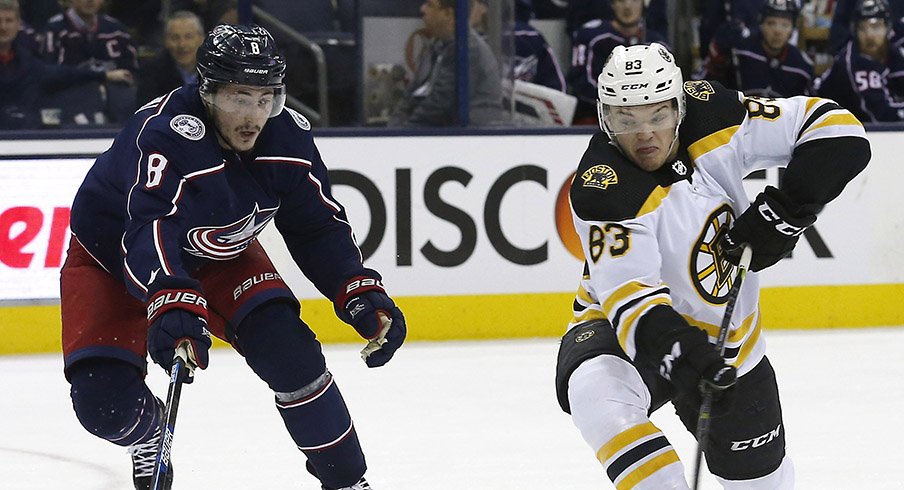We saw what the Columbus Blue Jackets are capable of when they're at their best.
Now, they're going to need to find another level.
While their four-game sweep of the Tampa Bay Lightning shocked the hockey world and busted more brackets than the NHL has seen in years, it's ancient history. As of Tuesday night, we know that the Boston Bruins are the Blue Jackets' opponent in the Eastern Conference semifinal, which begins Thursday night at TD Garden.
In the opening round, we saw the Blue Jackets do pretty much everything right in a largely flawless performance against a historically great team. So, how can they keep this snowball rolling down the mountain and make their first true playoff run in franchise history? Here are some keys to the series, highlighting what they'll need to do against an experienced, battle-tested Bruins team.
Special Teams
The Blue Jackets' power play was atrocious during the regular season, but did they ever wipe the slate clean in the playoffs. They scored five times on 10 tries (50%, for you math nerds) in the four-game sweep of Tampa Bay, after operating near bottom of the NHL (28th overall) in 2018-19. For all the deserved heat the Blue Jackets took throughout the season, they sure found a way to reset and make their power play a weapon against a Lightning team that boasted one of the league's best penalty-killing units.
Against the Bruins, this isn't much different. Boston had the league's second-best power play in the first round (43.3%) and made the Maple Leafs pay for taking penalties. The Blue Jackets, as we mentioned, were the NHL's best in the first round and got something from both units.
If there's a key to the series that stands out, it will be discipline – and the Blue Jackets allowed just one power play goal against Tampa Bay (and generally stayed out of the box, period).
Bob > Rask
As with any playoff series, goaltending is usually the difference.
We saw how it hurt the Maple Leafs in Game 7, with a sketchy early goal allowed by Frederik Andersen. After that, Toronto was chasing the game and it was 2-0 shortly thereafter. You need your goaltender to step up and make a difference, and the Blue Jackets got a terrific performance from Sergei Bobrovsky in the first round. Tuukka Rask's workload management helped him stay sharp in the playoffs, while Bobrovsky has played every game for the Blue Jackets since Mar. 24.
Bobrovsky's .932 save% in the series win over Tampa Bay is his best playoff performance to date, after years of questionable outings in the Stanley Cup tournament.
Top Players
"Your best players have to be your best players" is a tired hockey cliche, but in the playoffs, it's true. If you don't have your top players playing at a high level, chances are that your opponent's top players are – and then, you become easier to shut down. The Blue Jackets got a balanced effort in Round 1, but their skilled players showed up in a big way.
Remember, this was a four-game sweep for Columbus, but the numbers are impressive:
- Matt Duchene: 7 PTS (3 G, 4 A) in 4 GP
- Artemi Panarin: 5 PTS (2 G, 3 A) in 4 GP
- Seth Jones: 4 PTS (2 G, 2 A) in 4 GP
- Cam Atkinson: 4 PTS (2 G, 2 A) in 4 GP
If you're John Tortorella, those are the guys you want firing on all cylinders.
And if you're Bruins head coach Bruce Cassidy, you're probably feeling pretty good, too. The Bruins were led by Brad Marchand, who had nine points in seven games (4 G, 5 A) and right behind him was dynamic winger David Pastrnak, who finished with six points (2 G, 4 A).
Hang In There
This can't be overstated: the Bruins have a definitive edge in the experience category.
Boston has made a habit of both making the playoffs and making deep runs; they won the Stanley Cup in 2011 and have been regular participants in the postseason for the last decade. The core of their team has changed a bit over the years, but mainstays like Patrice Bergeron, David Krejci, Zdeno Chara and Rask are no strangers to playoff hockey – and the momentum and emotion swings that come along with it.
The Blue Jackets aren't green as the grass by any means, but they're still a bit wide eyed when it comes to the playoffs. Can that be a good thing? Of course it can. But there are bound to be learning experiences along the way and maybe some hard lessons, as well. If we've learned one thing from these Blue Jackets in four games of these playoffs, it's that not much rattles them.
If that trend continues, they'll be in good shape.
